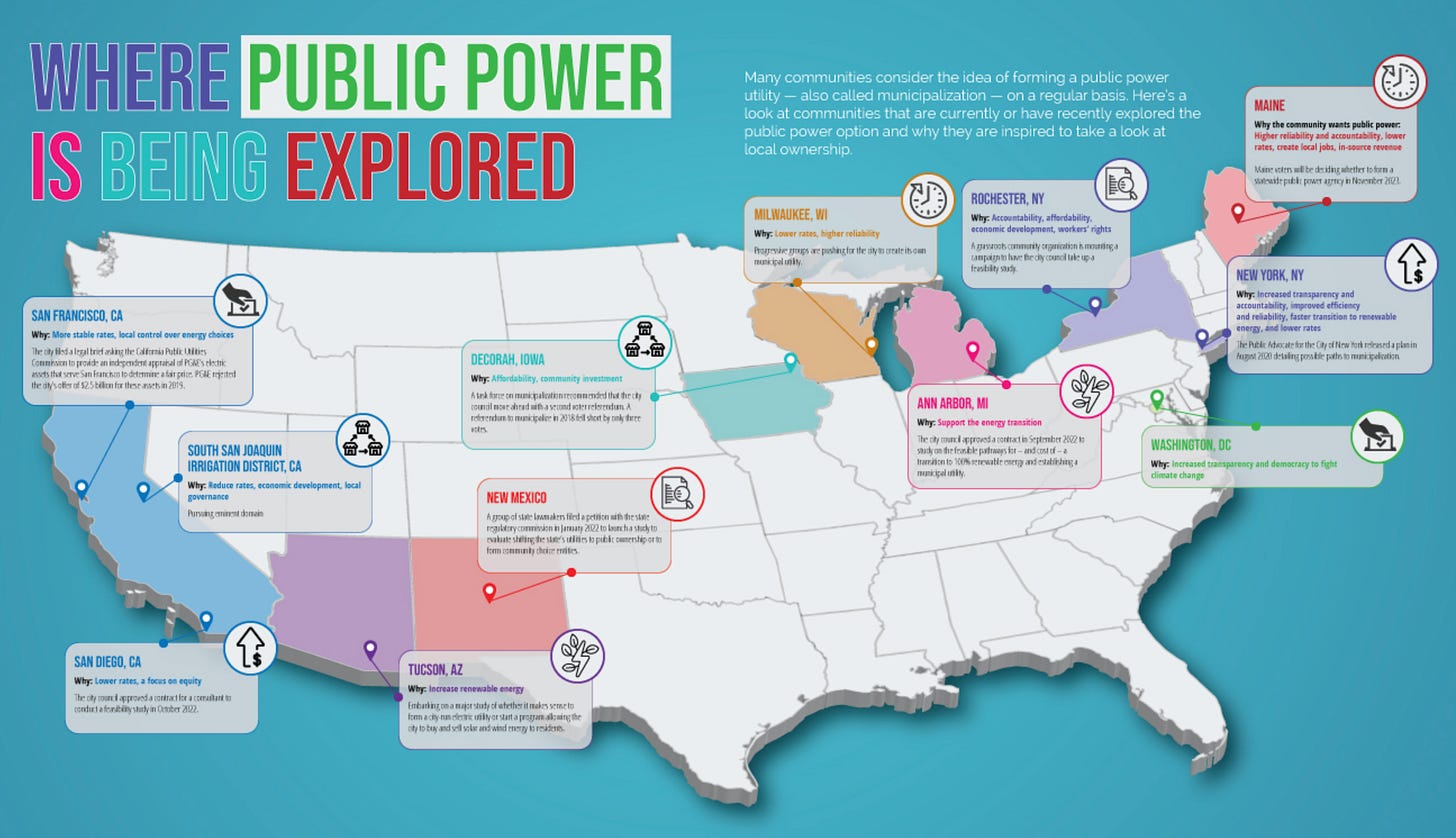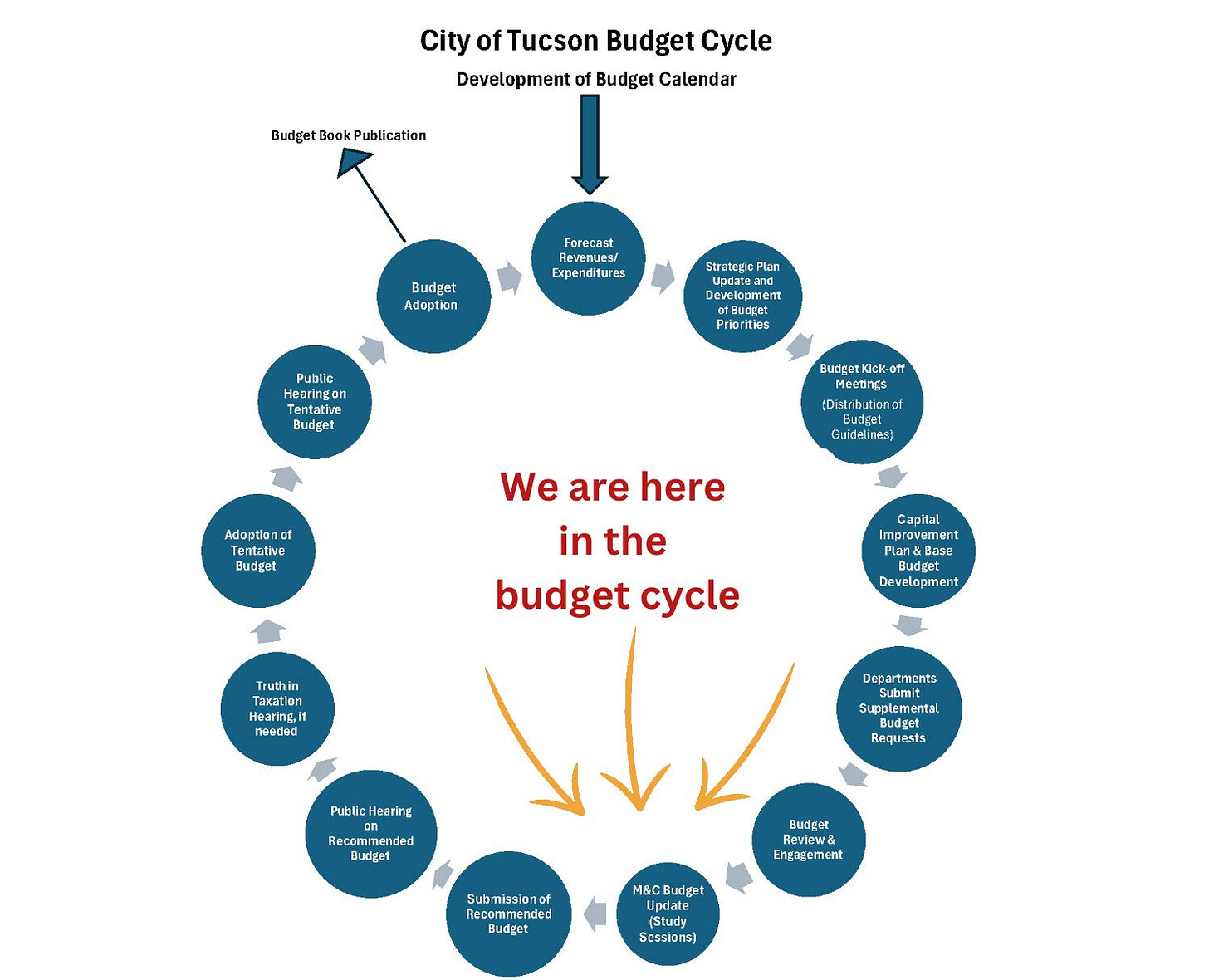Franchise agreement redux
TEP deal may head to voters … What's a supplemental request? … And that was one heck of an episode.
The hope for a city-owned electric utility in Tucson just took a big hit.
At their Tuesday meeting, the Tucson City Council started the process of putting a franchise agreement renewal with Tucson Electric Power (TEP) on the ballot in November.
If the measure does end up on the ballot and voters approve it, then the city will be sticking with TEP for a while longer.
The decision came right after a 90-minute executive session with City Attorney Mike Rankin, which lasted twice as long as the closed-door meeting was scheduled to take.
The agenda item, added at the last minute, was prompted by the city zoning examiner’s decision to deny TEP’s request to install new overhead lines at three key intersections, instead of putting them underground as required by the city.
That’s a big hiccup for TEP’s Midtown Reliability Project, which is planning to install new transmission lines through midtown Tucson.
If all this sounds familiar to you, it’s because a similar issue came up in 2023, when voters rejected Proposition 412.
That ballot measure would have extended the franchise agreement with TEP for another 25 years. The proposal also added a new fee, roughly $1 a month for a typical bill, to put utility lines (including those in the Midtown Reliability Project) underground.
Franchise agreements are common, and the city has similar agreements with Southwest Gas and Cox Communications to use city-owned right of way property to deliver their services.
These agreements have been used in the past to leverage agreements with the utility to provide additional services, including requiring Cox at one point to fund public access channels.
However, some city residents have been opposed to extending the agreement with TEP. They favor a municipal-owned model run by the city, arguing local control would lead to smaller rate increases in the future.
As part of the proposed new franchise agreement, the Council is asking TEP to ensure 100% of the electricity supplied to Tucson will come from renewable energy sources.1
The Council also wants the utility to contribute infrastructure and equipment to the Donna Liggins Recreation Center on 6th Avenue south of Grant Road, as well as align its long-term projects with the goals of Tucson’s climate action plan.
While the exact language of the agreement is still being discussed, insiders note that the franchise agreement doesn’t necessarily have to be 25 years. It could be significantly shorter.
The current agreement is set to expire in 2026 and city officials view this franchise as the best leverage to negotiate with the Canadian-owned private utility.
But don’t write off the idea of a city-run utility just yet.
The estimated cost is over $1 billion, but discussions about a city-owned utility are set to resume in May, when the consultant hired by the city delivers their final report to the Council.
Keep in mind, any deal with TEP will have to be approved by voters, and these types of propositions don’t always take a direct route to the ballot. The original plan for next week’s half-cent sales tax increase — now known as Proposition 414 — was to put it on the ballot last year, but it ended up being delayed for many months.
So, this isn't the final word on the city's electric future.
It looks like Tucson voters could have another election this year. And it should be an interesting one! Upgrade your subscription today and we’ll help you stay on top of it all.
It would be really easy to write off supplemental budget requests (asking for more money than you got last year) from city departments by simply labeling them as “wish lists.”
By now, most of these supplemental budget requests have found their way onto the desk of City Manager Tim Thomure, but it still will be several weeks before the Tucson City Council signs off on changes to departmental budgets.
So why bring it up as one of the first chapters in our bite-sized budgeting series? Because it is far more nuanced than simply dismissing these requests as unnecessary.
In our current political climate, adding a dollar to next year’s budget has somehow become indicative of fraud or financial mismanagement to Tucson’s loudest critics.
Often, a supplemental budget request is tied to external forces beyond the control of the city.
For labor-heavy organizations, healthcare costs and state-mandated pension contributions often are the first calculation for next year’s budget, but we can easily go further down the rabbit hole. For example, the city has to cough up more money when software companies increase their license fees, or when inflation adds $1 to the cost of a tank of gas.
Even hiring a new police officer to fill an empty position is a dizzying maze of hidden, one-time costs that aren’t tied to the new hire’s paycheck. The city picks up the cost of training and outfitting a new police officer before they leave the station.
These examples are pedantic but they paint a picture of how city costs can increase without hiring (additional) staff, creating programs or offering more resources than it did last year.
We’ll be taking a close look at supplemental requests this year. For now, officials are telling staff to brace for a lean budget year, at least until they know what to expect from the federal government.
A marathon, not a sprint: The Tucson City Council races are getting off to a slow start, at least when it comes to campaign fundraising, the Tucson Sentinel’s Jim Nintzel reports. Nearly all the candidates had raised less than $1,000 as of February 22. The biggest fundraisers so far include Ward 6 candidate Miranda Schubert, the operations manager at community radio station KXCI. She raised about $13,600. Councilman Kevin Dahl, who’s running unopposed in Ward 3, raised nearly $23,000 for his reelection bid.
Skeptical reception: When Mexican officials finally got the chance to make their case to the U.S. Supreme Court on Tuesday, they were met with quite a bit of skepticism, the Associated Press reports. The Mexican government sued gun manufacturers, claiming the manufacturers know thousands of guns they make end up in the hands of violent criminal groups in Mexico every year. But both liberal and conservative justices appeared skeptical. Instead, it looked like they believed a 2005 federal law would shield the manufacturers from liability.
New reality: Now that the Trump administration’s tariffs are in effect, produce distributors in Nogales and Rio Rico are grappling with the “new paradigm for fresh produce out of Mexico,” the Arizona Daily Star’s Emily Bregel reports. The border in Southern Arizona is a hub for more than just fruits and vegetables. The tariffs are expected to drive up costs for cars, energy, and Mexican beer, among many other industries that make Arizona sixth in the country for trade with Mexico.
Same old nonsense: Those tariffs on Mexican goods are the result of a problematic phenomenon that’s been going on for years: “Outsiders hurting the borderland’s people because they see the region through the prism of crime,” Star columnist Tim Steller writes. And it’s not just coming from Washington, D.C. Even Arizona legislators, like Rep. David Marshall, a Republican from Snowflake, don’t understand that activities like flying a drone can be as innocent in border communities as anywhere else in the country.
Speaking of Tucson’s franchise agreements, we couldn’t help but remember an outrageous moment on the city’s public access channel that led to a national controversy.
Back in 1990, Tucson’s Channel 49 aired one episode of The Great Satan At Large, featuring videos of Adolf Hitler, under-age strippers, and a host who spewed every vile thought in his head straight at the viewer.
The single episode aired at 6 p.m. and the horrified managers of the channel made sure it wouldn’t air again. The host faced obscenity charges and left Arizona.
The renewable energy mandate that the city wants as part of the franchise agreement with TEP is specific to the city's own consumption, not the entire city's residents.









